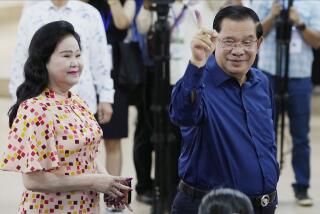Sihanouk Back as Cambodia Rebel Chief
- Share via
BEIJING — Cambodia’s exiled leader, Prince Norodom Sihanouk, said Sunday that he has resumed the presidency of the anti-Vietnamese resistance coalition to push for a peace settlement guaranteeing Cambodia true independence.
Cambodia has been put in “mortal danger” by recent international diplomatic moves that have raised the prestige of the Vietnamese-installed Phnom Penh regime virtually to the level of “de facto recognition,” Sihanouk said in a statement released Sunday.
Sihanouk charged that Vietnam--which invaded Cambodia in late 1978 and still has an estimated 100,000 troops there--has moved more than 1 million settlers into Cambodia to physically “Vietnamize” the country. He also charged that the Cambodian army has been “stuffed” with Vietnamese soldiers.
Sihanouk sharply criticized Thai Prime Minister Chatichai Choonhavan for having met with Cambodian Premier Hun Sen in Bangkok last month, a session widely viewed as having lessened the diplomatic isolation of the Phnom Penh regime.
Chatichai’s policy “promotes the hold of Vietnamese colonialism on Cambodia, gives Hun Sen . . . de facto acquisition of governmental legitimacy, indefinitely postpones the return of Cambodia’s total independence and sacrifices the right of the Cambodian people to self-determination,” Sihanouk said.
Sihanouk resigned last July as president of Democratic Kampuchea, a U.N.-recognized exile government formed by the resistance coalition. He charged at the time that his nominal allies, the Khmer Rouge, were attacking his forces.
Other resistance leaders, however, in recognition of Sihanouk’s status as the only person believed capable of uniting all factions, left the position open with the expectation that he might resume it.
Sihanouk said that by resuming the presidency, he hopes to present Thailand--for years a key backer of the resistance coalition--with the opportunity to make “an unambiguous choice between a free Cambodia and a Communist Cambodia subservient to foreign powers.”
Thai Foreign Minister Siddhi Savetsila, who met with Sihanouk on Saturday, revealed after that meeting that the prince had decided to resume the top post. Siddhi also said that Sihanouk has accepted an invitation to visit Bangkok in April but that the Cambodian leader is still refusing to attend informal peace talks scheduled to begin next Sunday in Jakarta, Indonesia.
During the last six months of 1988, much of Sihanouk’s diplomatic effort was aimed at weakening the Khmer Rouge, which brutally ruled Cambodia from 1975 through 1978.
But Sihanouk now appears preoccupied with the fear that outside powers--possibly including China, the most important sponsor of the resistance--may accept a settlement that leaves the Hun Sen government in place.
“In recent months a certain number of foreign powers have wanted to impose an unjust and unacceptable solution to the Cambodian problem,” Sihanouk said in his statement. “That is to say, a solution that will not return to my country . . . its full sovereignty and its total independence.”
Sihanouk insists that any peace plan for Cambodia must provide for the introduction of U.N. peacekeeping forces and creation of a provisional government of national reconciliation headed by himself.
More to Read
Sign up for Essential California
The most important California stories and recommendations in your inbox every morning.
You may occasionally receive promotional content from the Los Angeles Times.













